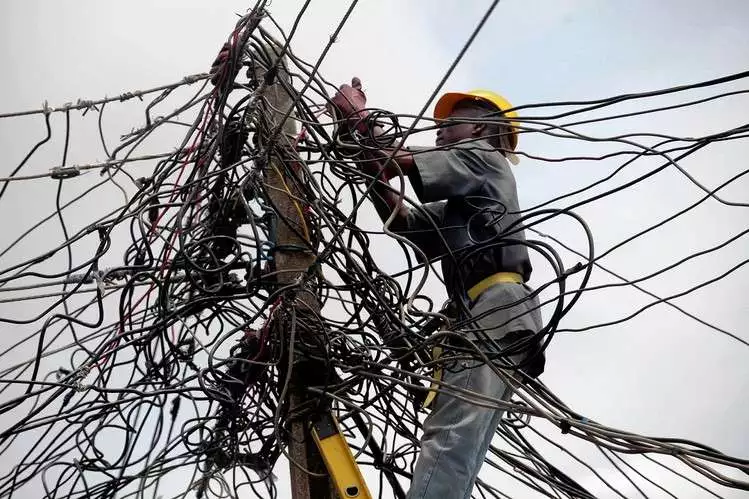Nigerians know that it is ‘One Week, One Trouble’ in the power sector. They know that the cause of the darkness experienced in most parts of each day is either that there is shortage in gas supply because the Niger Delta militants had either blown up gas pipelines or vandalised them.
They also know that it is because the Transmission Company of Nigeria (TCN) cannot transmit the generated electricity to the Distribution Companies (DISCOs) because of rusty and outdated transmission network. Nigerians also know that the DISCOs are neither efficient nor effective in making electricity reach the final consumers, because they are only out to collect revenue by hook or crook, and do not have the capacity to invest in the sector to boost distribution infrastructure and maintain them.
What again? Nigerians know that the water level is always and mostly very low to allow increased power supply, including the fact that there are always systems breakdown. There are myriad reasons for making Nigeria ‘a Nation in Darkness’.
However, Nigerians are tired. There is something they don’t want to hear and know from government and the stakeholders in the power sector. They don’t want to hear and know about these alibi’s and lame excuses to justify their failure to boost the power sector.
In a chat with Taiwo Akinjide, a civil servant in Lagos state, he not only expressed anger but pity and disappointment at the rate government is quick to defend its failure to make the power sector work. This followed recent information by government that the power sector had lost about N108 billion in the first quarter of this year due to water, gas, and transmission constraints.
“ Is government not tired of all this blame game? Don’t they think that Nigerians are tired of the lots of reasons to justify their failure? What the people need is light, electricity to boost their businesses and enjoy improved lifestyle.
“ Nigerians are tired of these lame reasons for poor electricity supply as government continues to justify the DISCOs ripping-off electricity consumers in so many ways without providing the required/paid services, while defending and protecting them from the wrath of the helpless people with so much jargons, indices and statistics which the people do not understand. What the people need is light not bags of reasons for darkness.
“You know that in this part of the world where people still have their indigenous languages on ground, the lingua franca, English language, is best means of telling so much lies to confuse the people who do not really understand it,” he said.
The Nigerian Electricity Supply Industry (NESI) recently revealed that the powers sector lost about N108 billion during the first three months of this year due to several constraints inhibiting the regular supply of electricity in the country, including water, gas and transmission constraints.
Released data from the agency revealed that the power sector loses between N1.2 billion to N1.5 billion monthly to water, gas and transmission line constraints.
For instance, on January 25, 2018, average power sent was 3,971mw and 2,302.8mw was not generated due to unavailability of gas. About 417mw was not generated due to unavailability of transmission infrastructure, while 290mw was not generated due to high frequency resulting from unavailability of distribution infrastructure.Therefore, on that day, the sector lost an estimated N1.584 billion due to insufficient gas supply, distribution infrastructure, and transmission challenges.
In his speech, Minister of Power Works and Housing, Babatunde Fashola, while reiterating Federal Governments commitment towards ending the quagmire in the power sector, acknowledged that the power sector is plagued with structural issues in all key areas- generation, gas supply, transmission and distribution, while the operational capacity of the country’s power plants is less than a third of their installed capacity.
Chronic vandalism has crippled oil and gas pipelines, creating gas shortages at power plants and underinvestment in maintenance and infrastructure has constrained the transmission grid.
“While it is no longer news that we have reached a 7,000MW generation capacity, and have a 5000MW distribution capacity, what is newsworthy is that last month we met with Manufacturers Association of Nigeria (MAN), DISCOs, and GENCOs “on how to implement the Eligible Customer Policy and increase connectivity to the 2000MW that is available,” he said.
He disclosed that the Federal Government had secured the World Bank’s approval for $486 million Transmission Company of Nigeria (TCN) transmission expansion funding, while progress is being made with the same bank for the Rural Electrification and Distribution Expansion Funding.
He expressed joy that in ‘many parts’ of the country connected to the grid, Nigerians are enjoying more light, even though all the problems are not solved. “Citizens acknowledge more power in dry weather, reduced hours of running their generators and reduction in fuel (diesel and petrol) purchase to power generators,” he added.
In his reeaction, Jane Abdul, a University graduate who operates a provision store within Ketu axis of Lagos state, in a chat with the Magazine said: “ Government should know that we are tired of these their watery reasons for poor performance. They were elected to solve these problems, some of which may be true.
“ My fears are that the NESI did not say how they have been trying to surmount the problems which are not new. Now, government has collected a whooping $486 million loan to boost the transmission network ‘as election approaches’. Who will monitor the right disbursement of this money?
“ Please, what Nigerians need is constant light and not the darkness we are forced to pay for. Whether they like, they should go and collect loan and do it, or find ways of increasing water level or gas supply. What we want is light.”
Discover more from The Source
Subscribe to get the latest posts sent to your email.








